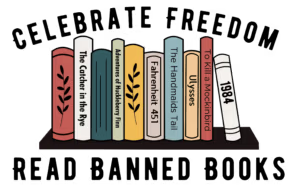Book banning has reached unprecedented levels in American schools and libraries, with over 10,000 books banned during the 2023-2024 academic year alone. This dramatic surge represents a nearly threefold increase from previous years, with Florida and Iowa accounting for approximately 8,000 of these bans.
The Current Crisis
The American Library Association documented 4,240 unique book titles targeted for censorship in 2023, along with 1,247 demands to censor library materials and resources. This represents the highest level of censorship ever documented by the ALA. The escalation has been driven by organized pressure groups and state legislation that makes it easier to remove books without due process.
Key Patterns in Modern Censorship:
- 47% of targeted books represent LGBTQ+ and BIPOC voices and experiences
- Pressure groups increasingly focus on both public and school libraries
- State laws have enabled mass removals without proper review
- Small groups of individuals are responsible for the majority of challenges
Historical Context of Suppression
The dark history of book banning reveals a consistent pattern of those in power attempting to control knowledge and suppress marginalized voices. In 213 BCE, Chinese Emperor Qin Shi Huang ordered the burning of all books except those on agriculture, medicine and divination, even burying scholars alive to suppress knowledge.
In the United States, the first documented book ban occurred in 1637 when Thomas Morton’s “New English Canaan” was banned by Puritan authorities for criticizing their power structures. Later, “Uncle Tom’s Cabin” was banned throughout the Confederate South in 1852 for its anti-slavery message.
The Human Cost
Book banning inflicts serious harm on students and communities:
Educational Impact
- Diminishes quality of education by removing valuable teaching resources
- Creates a chilling effect on teachers who avoid controversial but important topics
- Deprives students of exposure to diverse perspectives and experiences
Social Consequences
- Stifles critical thinking skills in young minds
- Suppresses emotional development and empathy
- Increases societal polarization by limiting exposure to different viewpoints
- Disproportionately affects students who rely on school libraries as their primary source of books
The Constitutional Question
The Supreme Court has consistently upheld students’ First Amendment rights against book banning. In the landmark 1982 Board of Education v. Pico case, Justice William Brennan wrote that school boards cannot remove books simply because they dislike the ideas contained within them.
A Pattern of Targeting Progress
Modern book banning efforts follow historical patterns of targeting works that challenge existing power structures or advocate for social progress. Currently targeted books often include:
- Works addressing racial justice and history
- LGBTQ+ themed literature
- Books dealing with sexual health and identity
- Works addressing controversial historical events
The Path Forward
The fight against book banning requires sustained resistance from educators, librarians, students, and community members who understand that intellectual freedom is essential to democracy. While parents have the right to guide their own children’s reading choices, they do not have the right to restrict access for an entire community.
The current wave of book banning represents more than just removed books – it represents an assault on the fundamental principles of education, critical thinking, and democratic discourse. History shows that societies that ban books inevitably find themselves on the wrong side of progress, justice, and human rights.
As we face this crisis, we must remember that every banned book represents a silenced voice, a suppressed perspective, and a missed opportunity for understanding. The solution lies not in restricting access to challenging ideas, but in fostering open dialogue, critical thinking, and the freedom to explore diverse perspectives that form the foundation of a truly democratic society.
Literary Landmarks Under Fire
1. Ulysses by James Joyce
This modernist masterpiece revolutionized literature with its stream-of-consciousness style. Initially banned for its frank sexual content and unconventional style, it’s now considered one of the greatest English-language works of the 20th century.
2. To Kill a Mockingbird by Harper Lee
This Pulitzer Prize-winning novel confronts racism and injustice in the American South. Despite its status as a literary classic, it continues to face challenges for its treatment of racial themes and use of period-specific language.
3. The Handmaid’s Tale by Margaret Atwood
This dystopian novel explores themes of women’s rights, theocracy, and reproductive freedom. Its powerful commentary on authoritarian control has made it both influential and controversial.
4. Beloved by Toni Morrison
Morrison’s Nobel Prize-winning work confronts the psychological horror of slavery through a ghost story. The book remains a frequent target of censorship for its unflinching portrayal of historical trauma.
5. The Catcher in the Rye by J.D. Salinger
This iconic coming-of-age story has faced continuous challenges since its publication for its profanity and complex themes about teenage alienation.
6. The Satanic Verses by Salman Rushdie
This controversial work sparked international debate about religious freedom and artistic expression, leading to its author living under threat for decades.
7. Adventures of Huckleberry Finn by Mark Twain
This American classic has faced continuous challenges since its publication in 1885, initially for its “coarse” language and later for its portrayal of racial issues.
8. 1984 by George Orwell
This prophetic novel about totalitarianism and surveillance has been banned in various countries for its political commentary.
9. The Bluest Eye by Toni Morrison
Morrison’s first novel tackles racism, beauty standards, and trauma in American society, remaining controversial for its honest portrayal of difficult subjects.
10. Fahrenheit 451 by Ray Bradbury
In an ironic twist, this novel about book burning and censorship has itself been banned multiple times for its themes and content.
Citations:
[1] https://www.ala.org/bbooks/book-ban-data
[2] https://www.nytimes.com/2024/04/16/books/book-bans-public-schools.html
[3] https://helenacollege.edu/library/docs/ResearchPapers/kent_writ-101-research-paper.pdf
[4] https://www.britannica.com/procon/book-bans-debate
[5] https://informationmatters.org/2023/10/silenced-voices-ripples-of-book-ban/
[6] https://thisbookisbanned.com/on-censorship/book-banning-burning-throughout-history/
[7] https://www.tc.columbia.edu/articles/2023/september/what-you-need-to-know-about-the-book-bans-sweeping-the-us/
[8] https://www.npr.org/2024/04/16/1245037718/book-bans-2023-pen-america
[9] https://www.freedomforum.org/famous-banned-books/
[10] https://guides.csbsju.edu/c.php?g=1340732&p=9907970
[11] https://www.freedomtoread.ca/resources/bannings-and-burnings-in-history/
[12] https://readingpartners.org/blog/history-banned-books-week/
[13] https://guides.library.harvard.edu/c.php?g=1269000&p=9306840
[14] https://sites.uab.edu/humanrights/2023/01/12/book-bans-in-the-united-states-history-says-it-all/
[15] https://www.careharder.com/blog/the-history-of-book-bans
[16] https://www.freedomforum.org/famous-banned-books/
[17] https://theweek.com/arts-life/955839/famous-book-bans
[18] https://www.malindalo.com/blog/2024/9/26/banned-books-week-2024-still-getting-banned
[19] https://www.latimes.com/entertainment-arts/books/story/2023-05-15/15-most-banned-books-2022-2023
[20] https://www.britannica.com/procon/book-bans-debate
[21] https://en.wikipedia.org/wiki/Book_banning_in_the_United_States_(2021%E2%80%93present)
[22] https://www.cbsnews.com/pictures/the-50-most-banned-books-in-america/
[23] https://academic.oup.com/pnasnexus/article/3/6/pgae197/7689238?login=false
[24] https://www.usatoday.com/story/news/nation/2024/09/24/book-censorship-2024-preliminary-reports/75355464007/
[25] https://www.edweek.org/teaching-learning/book-bans-over-the-years-in-charts/2023/04
[26] https://publishyourpurpose.com/blog/why-book-banning-bad/
[27] https://firstamendment.mtsu.edu/article/book-banning/
[28] https://hudexplorernews.org/1312/opinion/book-banning-does-more-harm-than-good/
[29] https://troylambertwrites.com/blog/2023/12/28/why-banning-books-is-never-right/
[30] https://www.gse.harvard.edu/ideas/ed-magazine/23/11/book-bans-and-librarians-who-wont-be-hushed
[31] https://advocatesforinclusiveeducation.org/blog/banning-books-is-not-the-answer-to-challenging-ideas
[32] https://informationmatters.org/2023/10/silenced-voices-ripples-of-book-ban/
[33] https://helenacollege.edu/library/docs/ResearchPapers/kent_writ-101-research-paper.pdf










